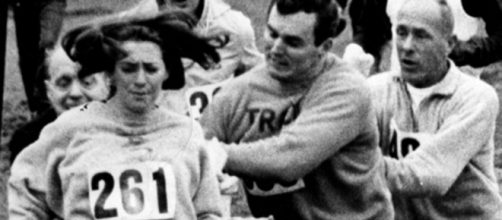Among the competitors in the field in this year's Boston Marathon was Katherine Switzer. At age 70, she completed the 26.2 miles run in 4:44.31. Forty-three other women, age 70 and older, completed this grueling course, and Switzer placed 8th among her peers.
Her 2017 finish - remarkable for any 70-year-old individual, male or female - isn't actually the most intriguing nor the most memorable aspect to Switzer's finish. Fifty years prior, she was the first and only female to cross the 1967 Boston Marathon finish line, a mark that helps to cascade the participation of women in both track, field, and running as well as other athletic endeavors.
Switzer's 1967 Boston Marathon
As a journalism student at Syracuse University, Switzer had no athletic opportunities available to her. Women's sports simply didn't exist at that time. To compensate, she unofficially began training with the men's cross-country team. Participating in men's long distance running, she met and gained the confidence of her mentor and eventual coach, Arnie Briggs.
With no particular rule preventing women from running, she paid her entry fee, pinned on her bib and prepared for the race start. She, along with Arnie and a couple additional supporters planned to run together. Soon after the race began (within one mile from the start), John "Jock" Semple, a Boston Marathon official, attempted to grab Switzer, rip her number 261 bib off of her and stop her from completing the race.
He fearfully and childishly railed that "if that were my daughter, I would spank her" - a mantra that today's best memes still hilariously mock. He failed to prevent Switzer from her plan. She finished in 4:20:00.
The rest of Switzer's story
Though Switzer was the first female to complete the race, it wasn't until 1972 that women were officially allowed to compete in the Boston Marathon. Semple's actions and subsequent comments about females became - and still remain - a point of empowerment for women and personal embarrassment for him.
In 2017, to honor and celebrate her 1967 participation, Switzer once again took to the streets of Boston to complete one of the most challenging marathons anywhere in the country, in the world.
This time the press followed her not to dramatize a battle between her desire to run and gender bias on the part of a race official, but to celebrate the remarkable change on behalf of mainstream athletics like the Boston Marathon.
Becoming more inclusive has helped to build the scope and success of America's Patriot's Day marathon event.
Hi everyone! I'm on the course at the 2017 Boston Marathon and this is the place where Jock Semple tried to pull... https://t.co/4p9EiavLQF
— Kathrine Switzer (@KVSwitzer) April 17, 2017

